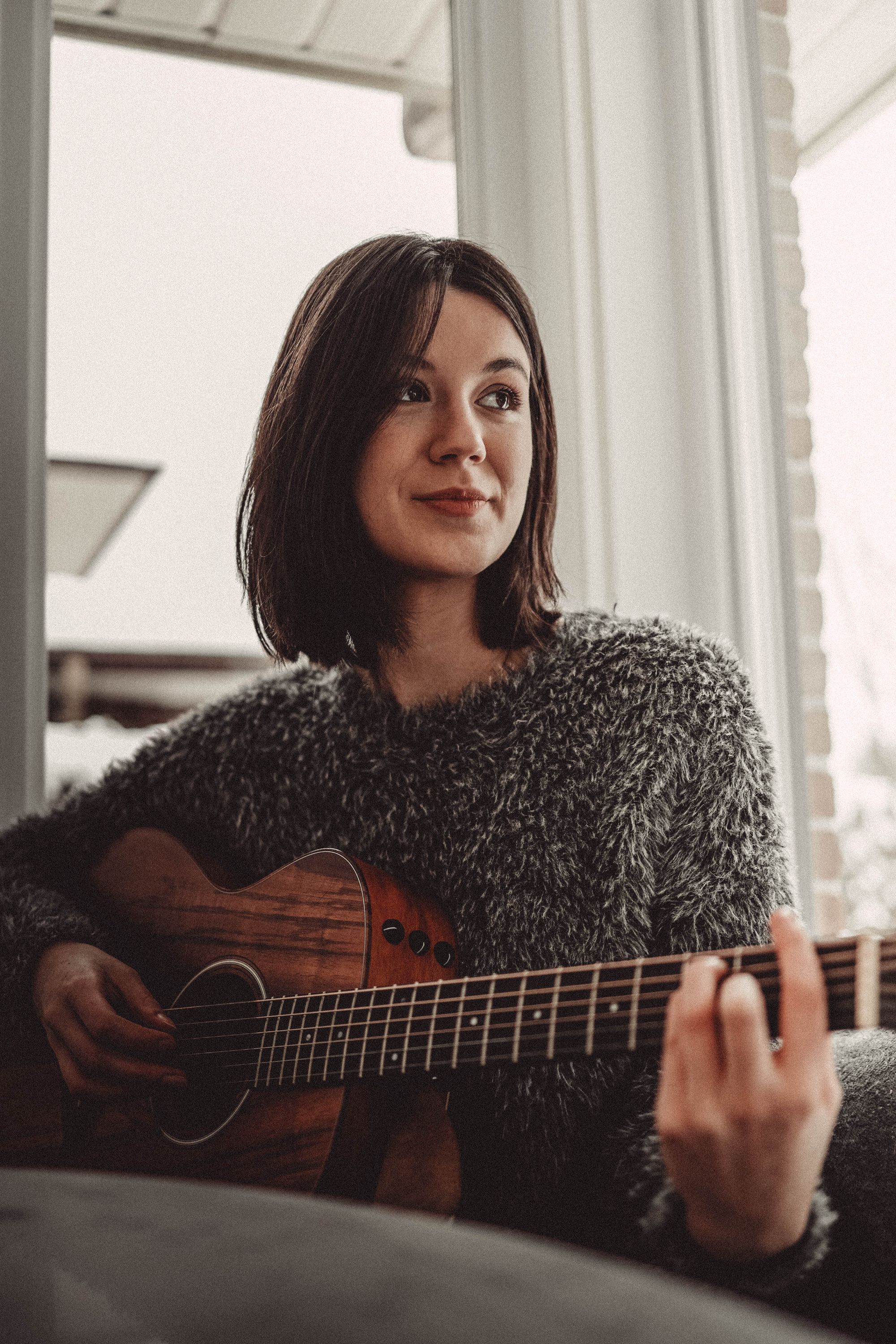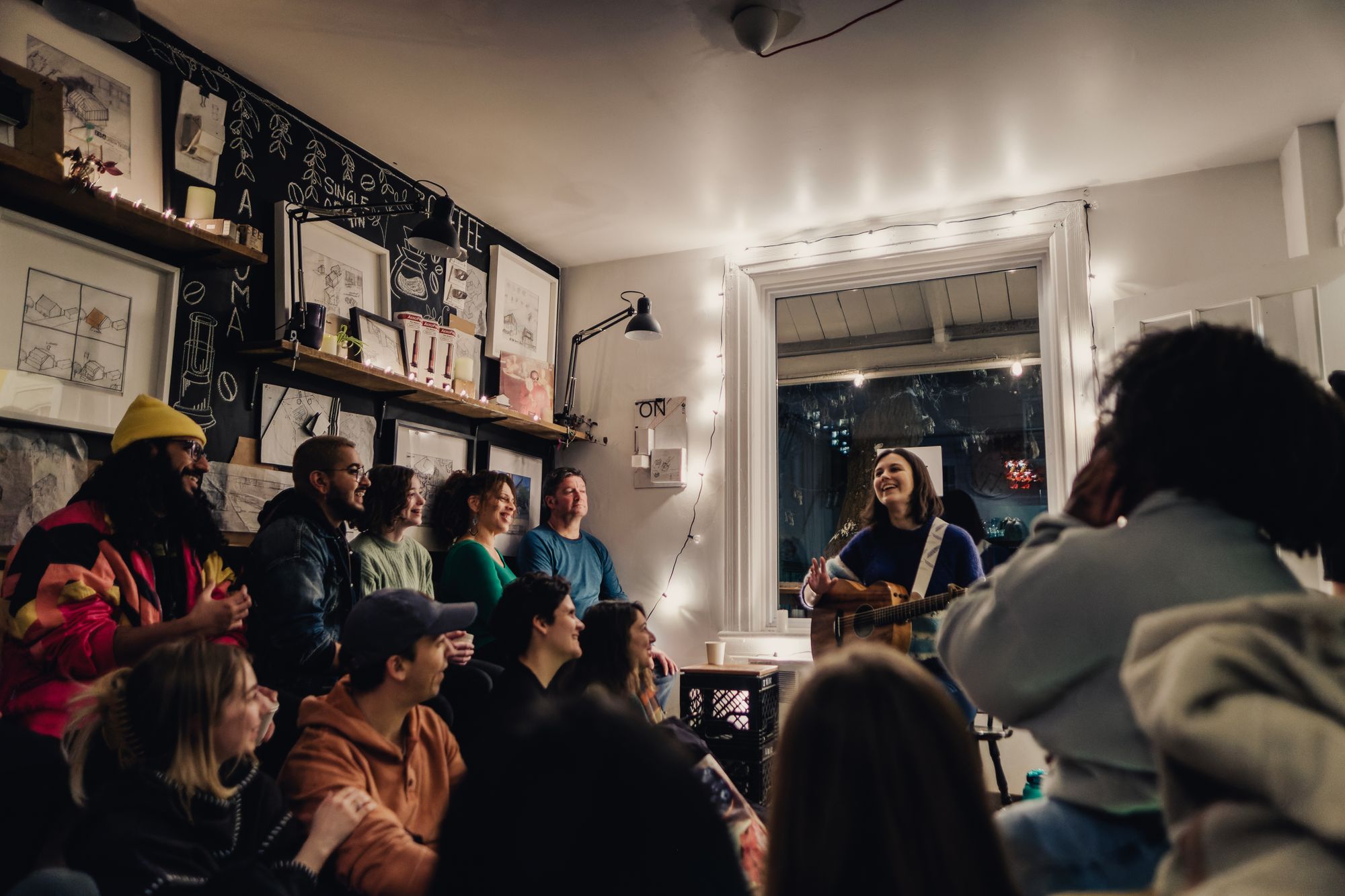How Emma Lamontagne Stumbled onto Success

By Manus Hopkins
Emma Lamontagne describes herself as a pop-folk singer-songwriter who tends to add standup comedy into her stage routine. The Kingston-born, Ottawa-based artist places high value on being candid in all aspects of her expression, artistic and personal. Because her work often involves heavy subject matter, she uses humour as a way to break the tension with audiences.
“That’s been my performing style, to have a lot of stage banter,” Lamontagne explains. “Even if I'm going to perform a super heartbreaking song, my goal is to make the audience feel a little lighthearted. I think everything that I write and at least try to do all ties into how I want my performances to go in the future, if that makes sense.”
Lamontagne was fortunate enough for her parents to put her in music lessons when she was very young. Since neither of her parents had the chance to have music in their lives growing up, they wanted to make sure she and her brother had had that opportunity. When Lamontagne was 15, she met a vocal teacher who looked at some of her poetry and encouraged her to start writing songs.
“Thanks to her, I did,” Lamontagne says. “The following year, when I was 16, I ended up winning the She’s The One [Canada] competition at [Ottawa] Bluesfest.”

Lamontagne went onto do a few writing trips through Festival House Inc. and Cadence Music Group. She says she was thrown into the cowriting world, and her collaborations led to the release of her calling card single, “I Don’t Sleep.”
“When my song came out, it ended up getting picked up on CBC and I think it might be at half a million streams now,” she says. “So, it’s been pretty reaffirming to me that I'm on the right path.”
Lamontagne admits it can be tough to accept how successful she has become already at such a young age. The singer-songwriter is only 23 and was still in high school when her first hit song broke.
“I had all these students coming up to me, people I've never spoken to, I've only seen, and everybody was sharing the song online,” she says. “And they would come and ask me about it. It was definitely weird because I was quiet. I'm a very quiet person. I don't approach people very often, so to be approached was a very big change in terms of my social life. I don't think I'm dealing with it any better now, though.”
She may not have been expecting quick success at an early age, but Lamontagne always had a penchant for writing. She says poetry always came naturally to her, and it was just a matter of being pushed a little bit to realize the words she was writing could easily be put into songs as well. Writing on her own in private journals was one thing, but what has made Lamontagne into a career songwriter, in her view, was linking up with seasoned writers and learning to collaborate.

“I think what really developed me as a writer was learning how to co-write so young and picking up on skills from established writers such as Rob Wells, who ended up producing my debut album, and Robyn Dell’Unto, who's now one of the most sought-after Canadian writers living in Nashville,” she says. “I learned stuff from them on how to be more successful and make every session count. And I think that put me way further ahead than if I had been writing on my own this whole time.”
A mindset Lamontagne says hindered her in the beginning was the mentality that every song she wrote had to be a hit. She was able to let go of that, in part because the pandemic lockdowns helped her to let go of those intentions in her sessions. Her thought process was that if she wasn’t going to be performing the songs in front of people, her focus should be to make sure she was happy with them herself, and nobody else would ever have to hear the results of any sessions she didn’t want to share them.
“Since I was able to do that, I have been climbing up the ladder in terms of writing with bigger artists and slowly getting more cuts and more consideration for people to record songs outside of my own artist project,” she says. “It's definitely been this whole work in progress since lockdown.”
Coming from a musical background with training in piano and being self-taught on guitar (though she performs mainly on guitar because it’s an easier instrument to carry around) and having a knack for writing, Lamontagne felt it was natural to marry the two when stepping into the world of songwriting. She prefers to write on piano still, but reaches for a guitar when it’s the most readily available instrument in a session.
Lamontagne considers herself an on-the-fly person, meaning if she’s not booked in a session, she’ll be coming up with song ideas and snippets all the time.
“I have lots of notes with title ideas, or even just themes of what I think would be a good song idea and lyrics,” she says, adding with a laugh, “I have lots of lots of voice recordings in my phone with the shower in the background or a flushing toilet.”
With notes and voice recording apps full of ideas, Lamontagne occasionally has to take a few hours to sit down and organize the potential song leads and says it can be difficult to keep track of all of them, especially when she is working on her own music along with songs for other artists.
“My main goal right now is to balance out building my career as a songwriter and building my career as an artist,” she says. “So, I have decided to take maybe until September, a performing break, so I can really focus on the writing.”
Working at home, Lamontagne has received an Ontario Arts Council grant to help her fund her home studio she’s been building.
“That way I can really get into recording during sessions and recording for artists who are in the US and Europe,” she explains. “And then my plan is also to start working as a session musician. It’s just all about networking and making more contacts. I am someone who definitely struggles with the big picture of the future. I definitely want to be able to work my way up to having a publishing deal where I can have more help because one of the things I deal with is that I have chronic illness. So, I do have like limited energy especially for communication.”
On navigating her work while dealing with chronic illness, Lamontagne says she has been focusing on the people who support her through the struggles. She rarely reschedules sessions but prefers to work with writers who allow her to do so if she needs to, understanding that she’ll work better, and the session will be more successful if she takes the rest time she needs.
“Those are the people I've been choosing to have in my bubble right now,” she says. “Because otherwise, it's really difficult. And it exists everywhere. I think people are not necessarily intentional about their judgment, but I think a lot of people don't understand unless they have experienced with chronic illness themselves or through a loved one that it's very difficult to maintain your social connections and your professional connections during flareups that can last days or months, when you have such a limited energy stock.”
When Lamontagne was 18, she was accepted into the Holland Bloorview Kids Rehabilitation Hospital in Toronto, to help with pain management. While she was there, she played guitar and sang every day for a group of kids on her floor.
“It was that moment where I realized those are the people who I'm speaking for; it's not just to bring awareness that I'm so open about my medical conditions and my struggles, but it's a lot for those kids who don't have someone to look up to,” she says. “And if I can do my best to be that, then I will. But for someone else, I know that it might be too difficult to talk about their medical condition, so I never hold any judgment or expectations.”
Lamontagne has a supportive family around her and a network of people who want to see her succeed, and she says this helps with the impostor syndrome she can face too, adding that probably every artist has some degree of impostor syndrome. Lamontagne doesn’t shy away from discussing any of her own struggles, but putting a comedic spin on serious subjects in her performances wasn’t always a conscious decision. It started with a malfunctioning keyboard and a need to fill some dead space with chatter at one performance, and when someone shouted form the back that Lamontagne should take up comedy, it became a part of her image, even though at the time, she didn’t really think she was being funny.
“I have noticed that it just shows to my audience how resilient people with chronic illness have to be to survive in this world; not that that's like my intentional meaning of having banter around those moments, but if I allow myself to just sit in my sorrow, I will never get anything done and I'll never leave my house.” Lamontagne explains. “So, I try to find those moments of joy for myself, even if it's fleeting, like a TV show episode. Joy right now, especially in this world, it's so difficult to come across, so if I can do something to also prevent my audience from feeling how sad I was in that moment, I think that's also been important to me.”
At every show she plays, Lamontagne has people come up to her afterwards and talk to her about how her music and words have helped them with a myriad of different situations, feelings, and struggles. These are some of the most special moments for her, and can remind her why she continues to create and perform her songs.
“It just hits so much harder when they tell me about their cancer journeys or undiagnosed medical conditions, because a lot of them are very difficult to figure out,” Lamontagne says. “I've even had parents who come up to me to ask me about how they can help their children navigate their own health issues. It’s just the best feeling to know that, at the end of the day, I am making an impact.”
Manus Hopkins is a freelance writer based in Toronto.
He can be reached at manus.hopkins@torontomu.ca
